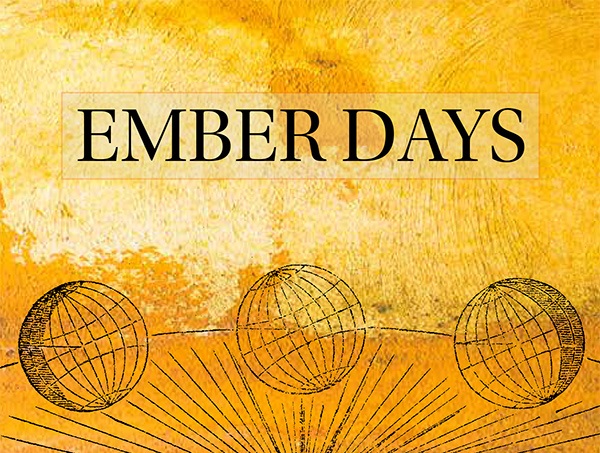By Jay Innis Murray
Mary Gilliland is the author of two award-winning poetry collections: The Ruined Walled Castle Garden (2020) and The Devil’s Fools (2022). Her new collection, Ember Days, will be published on March 1 by Cod Hill Press. The question that makes my review’s title is the title of a beautiful poem about twenty deep into Mary Gilliland’s wonderful, intelligent new book. It is one of my favorite poems in the volume, and it is exemplary for this volume as it combines history, science, metaphysics, and a telescoping view of time (looking both forward and back) while prodding us with the type of urgent question that demands an answer from us in the form of our attention. Along with poems that remind a reader of John Donne’s “A Nocturnal Upon St. Lucy’s Day,” the ironic mood of Elizabeth Bishop’s “One Art,” or the noticing of the natural world in the poems of Gary Snyder, there are also fragments of more personal history that Gilliland has included. The movement from start to finish is from a sort of despondency to resolution and hope.
Between the table of contents and the first poem, Gilliland provides some context for her title Ember Days. These are rituals with ancient forms that are less visible today.
An Ember Week, built on earlier human observances of the sun’s extremity at summer and winter solstice and the orb’s pause at autumn and spring equinox, starts each season in the Christian liturgical calendar, traditionally observed with 3 days of fasting and prayer.
In reading some about this, I was delighted to see St. Lucy’s Day is one of the markers of the year that would begin an Ember Week fast. This confirms what seems an obvious link to Donne’s work. The first poem in the book is “Offering the Body: The Tibetan Practice of Chöd.” If the title doesn’t wake the reader, we’re quickly told: “Anything I’d planned to do is over.” A grim statement. The poem has an imagery of blood and bones, silence, and emptiness. Beginning with the end, it feels like, as the speaker’s matter of fact Anything I’d planned to do is over cuts through the more metaphysical theme. With the next poem, “Infinitives” we can be assured we’re in the hands of a writer who is concerned with the world, with life here on Earth. She attends to burning oil fields, brand names, marketing geniuses, “resources burnt to a crisp threshold,” but, also, memories of grandparents, generations gone, the lives of grandparents who rode streetcars in the hot summer.
Gilliland has a gift for making phrases that are economical and precise. This is obvious in poems in all her registers from the most metaphysical to those that feel like personal history. I was as thrilled by the closing of “Outside the Tunnel Snow is Melting:” Watch what happens/when what’s happening/wants to stop, as I was moved by the more personal poem (about the poet’s father), “The Old Man Brought Home:” A stubbled saint fizzling in a twentieth century incarnation. This gift takes on urgency in a poem like “Tesla on a Leash” (about the inventor, not the vehicle). The actual world is worth all my appetites or His blueprint, the future, entered by accident, a breath floating by or a momentary scent of rain: utility.
There are a handful of poems here that feel most important as accomplished works of art. These are “Kitchen Theater,” “For the Record,” the title poem “Ember Days,” and, above all, “Pat Euphoria.”
“Pat Euphoria” opens with another searching question: How does a soul find its way from the twenty-first century, a gold-plated odeum with one in ten scenarios to play, an October palace of leisure with malice, more people in pieces than ever? We’re told later Departure time is pending. This is one of the recurrent thoughts in the book. Looks to the west, to the sunset, face into the westerlies. The time of this life is finite. We get a body that starts to break down. Still there are chances for transcendent beauty as in this beautiful noticing:
Above the city—ribbing, scales, sunlight cupping
pockets of the dark—a swart fish of the heavens
plies the line to the horizon. Swim, helpmate,
you’ll surface to the name, the fame
glued to the guy beside—yours, the twilight.
Or these:
What I wanted: native trees –
otters denned in riverbank –
ospreys free to breed, brood, hatch –
grazing that increases wildflowers
What I wanted: water vole – mountain hare –
Atlantic salmon – pillwort – sticky catchfly
What I wanted: movement that moved me.
These things the poet wants are at risk. Nature persists and keeps us going, but this world is at risk. As I mentioned above, the book veers to hope. Lines like The arc of history could bend with you begin to appear as the book nears its close. The final poem is a list of blessings, the perfect way to end. Here are some of the hopes.
May you want to continue more than you want to stop
May you be passed over by the local police
May no one stop your ears to the bee-hum
May your weeping with remembrance be in slippers
May you be forcible within your heart
Ember Days will be published on March 1. To pre-order, here is the link to the book’s page at Cod Hill: https://www.codhill.com/product/ember-days/
Here is the link to Mary Gilliland’s website for more information about her work.

Leave a comment